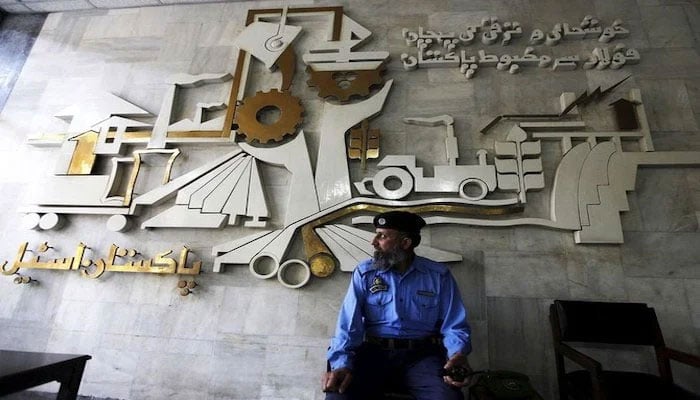Steel industry’s unregulated challenges

LAHORE: Our steel industry relies heavily on both imported raw steel and domestic steel scrap. While sales tax has consistently been collected on imported raw steel, domestic steel scrap has largely escaped sales tax. This year, a new sales tax has been imposed, but collection remains inconsistent.
In this year’s budget, the government introduced a sales tax regime on billets produced from local scrap to regulate the informal segment of the local steel manufacturing industry. However, industry players lament that despite budgetary approval, the necessary statutory regulatory order (SRO) to implement this change has not been issued, leaving steel producers using local scrap from unregistered suppliers in limbo until the end of the first quarter of this fiscal year. Experts estimate that the country is losing Rs8 billion in tax revenue each month due to the Federal Board of Revenue’s (FBR) reluctance to implement the 18 per cent sales tax on steel furnaces using locally procured scrap, a move intended to curb tax evasion among melters.
The regulated steel industry has repeatedly urged top FBR officials to comply with budgetary measures designed to boost revenues. Tax-compliant companies using imported scrap pay a total tax of 18 per cent, or Rs40,500 per tonne of billet -- Rs25,000 at the scrap import stage and Rs25,500 upon sale. However, in the absence of the SRO notification, those using local scrap are contributing only a trickle of tax revenue from their value chain.
“This situation is causing a significant tax revenue shortfall for the government and substantial sales losses for the taxpaying organized steel sector, as tax evaders can undercut their retail prices,” said Javaid Mughal, chairperson of a leading steel mill.
He questioned the motive behind the tax bureaucracy’s delay in issuing a straightforward SRO for unexplained reasons over the past three months.It was expected that this single measure could help the government net Rs85-100 billion annually. According to Mughal, at least two major steel mills in Karachi have shut down their operations due to massive losses from price competition with non-compliant furnaces.
Pakistan’s annual steel requirement is approximately 10-12 million tonnes, covering various sectors such as construction, manufacturing and infrastructure development. However, domestic production falls short of this demand. The country imports 2-3 million tonnes of finished steel products, including stainless steel, alloy steel and galvanized steel.
A significant portion of Pakistan’s steel products is manufactured from imported raw steel or semi-finished steel (such as billets and slabs). Large steel manufacturers depend on these imports due to insufficient domestic iron ore production. While Pakistan does recycle steel scrap, mainly collected from demolition sites, vehicles and machinery, the quantity of high-quality domestic scrap is limited, necessitating scrap imports.
Pakistan imports 2-3 million tonnes of finished steel products annually, particularly high-quality and specialized steel that the local industry cannot produce in sufficient quantities.
Local steel production, especially through Pakistan Steel Mills (PSM) and private-sector units, has declined in recent years, primarily due to the challenges faced by the PSM. Consequently, the bulk of demand is met through the private sector using electric arc furnaces (EAF) and induction furnaces, which utilize both imported and domestic scrap.
One of the biggest challenges facing the industry is the rising cost of imports due to currency depreciation and increased global steel prices, which exerts pressure on domestic industries and infrastructure projects reliant on steel.
-
 ‘Narcissist’ Andrew Still Feels ‘invincible’ After Exile
‘Narcissist’ Andrew Still Feels ‘invincible’ After Exile -
 Shamed Andrew ‘mental State’ Under Scrutiny Amid Difficult Time
Shamed Andrew ‘mental State’ Under Scrutiny Amid Difficult Time -
 Bad Bunny's Super Bowl Halftime Show: What Time Will He Perform Tonight?
Bad Bunny's Super Bowl Halftime Show: What Time Will He Perform Tonight? -
 Where Is Super Bowl 2026 Taking Place? Everything To Know About The NFL Showdown
Where Is Super Bowl 2026 Taking Place? Everything To Know About The NFL Showdown -
 Chris Pratt Explains Why He And Katherine Schwarzenegger Did Premarital Counseling
Chris Pratt Explains Why He And Katherine Schwarzenegger Did Premarital Counseling -
 Drake 'turns Down' Chance To Hit Back At Kendrick Lamar At Super Bowl
Drake 'turns Down' Chance To Hit Back At Kendrick Lamar At Super Bowl -
 Sarah Ferguson Had A ‘psychosexual Network’ With Jeffrey Epstein
Sarah Ferguson Had A ‘psychosexual Network’ With Jeffrey Epstein -
 Miranda Kerr Shares The One Wellness Practice She Does With Her Kids
Miranda Kerr Shares The One Wellness Practice She Does With Her Kids -
 Czech Republic Supports Social Media Ban For Under-15
Czech Republic Supports Social Media Ban For Under-15 -
 Khloe Kardashian Shares How She And Her Sisters Handle Money Between Themselves
Khloe Kardashian Shares How She And Her Sisters Handle Money Between Themselves -
 Prince William Ready To End 'shielding' Of ‘disgraced’ Andrew Amid Epstein Scandal
Prince William Ready To End 'shielding' Of ‘disgraced’ Andrew Amid Epstein Scandal -
 Chris Hemsworth Hailed By Halle Berry For Sweet Gesture
Chris Hemsworth Hailed By Halle Berry For Sweet Gesture -
 Blac Chyna Reveals Her New Approach To Love, Healing After Recent Heartbreak
Blac Chyna Reveals Her New Approach To Love, Healing After Recent Heartbreak -
 Royal Family's Approach To Deal With Andrew Finally Revealed
Royal Family's Approach To Deal With Andrew Finally Revealed -
 Super Bowl Weekend Deals Blow To 'Melania' Documentary's Box Office
Super Bowl Weekend Deals Blow To 'Melania' Documentary's Box Office -
 Meghan Markle Shares Glitzy Clips From Fifteen Percent Pledge Gala
Meghan Markle Shares Glitzy Clips From Fifteen Percent Pledge Gala



